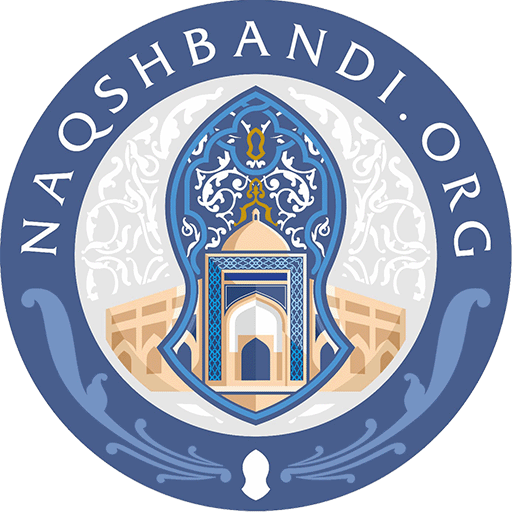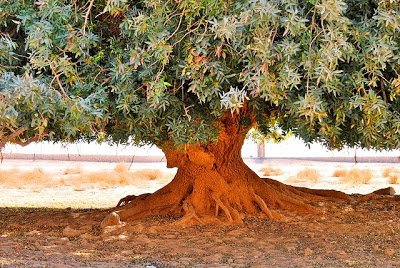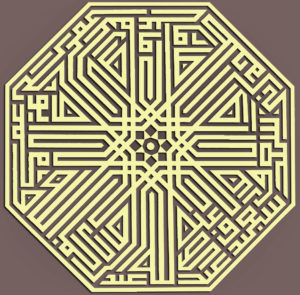 The moon traverses the constellations of the zodiac in a single night,
The moon traverses the constellations of the zodiac in a single night,
so why do you deny the mi`raj (Ascension)?
That wondrous, unique Pearl (the Prophet) is like a hundred moons
–for when he made one gesture, the moon was split in two.
And the marvel that he displayed in splitting the moon
was in keeping with the weakness of the creatures’ perception.
The work and business of the prophets and messengers
is beyond the spheres and the stars.
Transcend the spheres and their revolution!
Then you will see that work and business.
The Secret was transmitted and flowed from the Master of all Nations, the Messenger of Allah ![]() to the first Khalif, Imam of Imams, Abu Bakr as-Siddiq
to the first Khalif, Imam of Imams, Abu Bakr as-Siddiq ![]() . Through him the religion was supported and the Truth protected. Allah mentions and praises him in His Holy Qur’an in many verses:
. Through him the religion was supported and the Truth protected. Allah mentions and praises him in His Holy Qur’an in many verses:
“As for him who gives and keeps his duty, we facilitate for him the way to ease.” (Surat al-Lail: 5-7)
and
“And (away from the fire) shall be kept the most faithful who gives his wealth, thereby purifying himself,and seeks to gain no pleasure or reward other than the Presence of his Lord, the Most High.” (Surat al-Lail:17-21)
Ibn al-Jawzi states that all Muslim scholars and the Companions were certain that these ayats referred to Abu Bakr. Among all the people he was called “Al-`Atiq,” the most pious, delivered from the punishments of the fire.
When ayat 56 of Surah Al-Ahzab revealed that “Allah and his angels bless the Holy Prophet,” Abu Bakr asked if he also was included in this blessing. Ayat 43 was then revealed stating:
“He it is who sends His blessing on you and so do His angels, that He may bring you forth out of darkness into light. And He is merciful to the believers.”(Surat al-Ahzab: 43)
Ibn Abi Hatim explained that ayat 46 of Surah Ar-Rahman came in reference to Abu Bakr as-Siddiq ![]() :
:
“And for him who fears to stand before his Lord there are two gardens.” (Surat ar-Rahman:46)
and:
“We have enjoined on man kindness to his parents: in pain did his mother bear him, and in pain did she give him birth. The carrying of the (child) to his weaning is thirty months. At length, when he reaches the age of full strength and attains forty years, he says, “O my Lord! Grant me that I may be grateful for Thy favor which Thou hast bestowed upon me, and upon both my parents, and that I may work righteousness such as Thou mayest approve; and be gracious to me in my issue. Truly have I turned to Thee and truly do I bow (to Thee) in submission.” Such are they from whom We shall accept the best of their deeds and pass by their ill deeds: (they shall be) among the Companions of the Garden: a promise of truth, which was made to them (in this life).” (Surat al-Ahqaf: 15-16)
Ibn `Abbas says that these ayats came as a description of Abu Bakr as-Siddiq ![]() , Allah honoring and elevating his state among all the Companions of the Prophet
, Allah honoring and elevating his state among all the Companions of the Prophet ![]() . Ibn `Abbas notes further that ayat 158 of Surah Ali-`Imran was revealed in reference to Abu Bakr and Umar
. Ibn `Abbas notes further that ayat 158 of Surah Ali-`Imran was revealed in reference to Abu Bakr and Umar ![]() :
:
“And take council with them on important matters.” (Surat Ali-`Imran: 158)
Finally, the great honor accorded to Abu Bakr in accompanying the Holy Prophet ![]() on his flight from Makkah to Madinah, is referred to in the ayat:
on his flight from Makkah to Madinah, is referred to in the ayat:
“When the unbelievers drove him out, he had no more than one companion. The two were in the Cave, and he said to his companion, Fear not, for Allah is with us.” (Surat at-Tawbah: 40)
In addition to the praise of Allah, Abu Bakr as-Siddiq received the praise of the Holy Prophet ![]() and of his companions. This is recorded in many well known Hadiths.
and of his companions. This is recorded in many well known Hadiths.
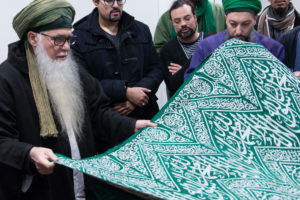
Mawlana Shaykh Muhammad Hisham Kabbani with Ghilaf of Rawdat an-Nabi (s)
The Holy Prophet ![]() said:
said:
“Allah will show His glory to the people in a general way, but He will show it to Abu Bakr in a special way.”
“Never has the sun risen or set on a person, other than a prophet, greater than Abu Bakr.”
“Never was anything revealed to me that I did not pour into the heart of Abu Bakr.”
“There is no one to whom I am obligated and have not repaid my debt except Abu Bakr, for I owe him much for which Allah will compensate him on the Day of Judgment.”
“If I were to take an intimate friend (khalil) other than my Lord, I would have chosen Abu Bakr.”
“Abu Bakr does not precede you because of much prayer or fasting, but because of a secret that is in his heart.”
Bukhari narrates from Ibn `Umar that, “In the time of the Prophet ![]() we were not recognizing anyone higher than Abu Bakr as-Siddiq, then `Umar, then `Uthman.”
we were not recognizing anyone higher than Abu Bakr as-Siddiq, then `Umar, then `Uthman.”
Bukhari also narrates from Muhammad ibn al-Hanafiya (Ali’s son): “I asked my father, ‘Who are the best people after Allah’s Apostle ![]() ?’ He said, ‘Abu Bakr.’ I Asked, ‘Who then?’ He said, Then `Umar. I was afraid he would say `Uthman next, so I said: ‘Then you?’ He replied, ‘I am only an ordinary person.’”
?’ He said, ‘Abu Bakr.’ I Asked, ‘Who then?’ He said, Then `Umar. I was afraid he would say `Uthman next, so I said: ‘Then you?’ He replied, ‘I am only an ordinary person.’”
Tabarani narrated through Mu`adh that the Prophet ![]() said, “I had a vision that I was put on one side of the scale and my Nation was put on the other side and I was heavier. Then Abu Bakr was put on one side and My Nation was put on one side and Abu Bakr was heavier. Then `Umar was put on one side and My Nation was put on the other and `Umar was heavier. Then `Uthman was put on one side and My Nation on the other and `Uthman was heavier. Then the scale was raised up.”
said, “I had a vision that I was put on one side of the scale and my Nation was put on the other side and I was heavier. Then Abu Bakr was put on one side and My Nation was put on one side and Abu Bakr was heavier. Then `Umar was put on one side and My Nation was put on the other and `Umar was heavier. Then `Uthman was put on one side and My Nation on the other and `Uthman was heavier. Then the scale was raised up.”
Hakim narrated that `Ali ![]() was asked, “O Ruler of the Faithful, tell us about Abu Bakr.” He said, “He is a person whom Allah called as-Siddiq on the tongue of the Prophet
was asked, “O Ruler of the Faithful, tell us about Abu Bakr.” He said, “He is a person whom Allah called as-Siddiq on the tongue of the Prophet ![]() and he is the khalif (successor) of the Prophet
and he is the khalif (successor) of the Prophet ![]() . We accept him for our religion and for our worldly life.”
. We accept him for our religion and for our worldly life.”
There are many other hadiths indicating the great attainment of Abu Bakr as-Siddiq ![]() with respect to all the other Sahaba.
with respect to all the other Sahaba.
Abu Bakr was the best friend and most beloved companion of the Holy Prophet ![]() . He was blessed by being first and foremost, throughout his life, in his belief, his support, and his love of the Holy Prophet. For this quality he was honored with the title of as-Siddiq, or the Veracious.
. He was blessed by being first and foremost, throughout his life, in his belief, his support, and his love of the Holy Prophet. For this quality he was honored with the title of as-Siddiq, or the Veracious.
He was the first free adult man to accept Islam at the hands of the Prophet ![]() . He had never joined in the worship of idols practiced by his contemporaries. He came to Islam without any trace of doubt or hesitation. Many years later the Holy Prophet
. He had never joined in the worship of idols practiced by his contemporaries. He came to Islam without any trace of doubt or hesitation. Many years later the Holy Prophet ![]() recalled: “Whenever I offered Islam to anyone, he always showed some reluctance and hesitation and tried to enter into an argument. Abu Bakr was the only person who accepted Islam without any doubt or hesitation, and without any argument.”
recalled: “Whenever I offered Islam to anyone, he always showed some reluctance and hesitation and tried to enter into an argument. Abu Bakr was the only person who accepted Islam without any doubt or hesitation, and without any argument.”
|
It is related that while on a trade trip to Syria, at age 18, Abu Bakr met Muḥammad ibn `Abdullah At a rest stop, Abu Bakr went to the local monk to talk about life and religion. In the meantime, the Prophet ﷺ waited under a sidra tree. During the conversation, the monk asked, “Who is under that tree? Nobody sits under it except a Prophet, and the last to do so was `Isa bin Maryam.” At that moment, absolute certainty entered the heart of Abu Bakr that Muḥammad Abu Bakr believed in Sayyidinā Muḥammad — [Imam al-Qurtubi, Tafsir Surat al-Aḥqaf] |
He was first in his spiritual support. He remained steadfast in his support throughout the difficult years in Makkah. He was the first to speak out when events passed beyond the understanding even of the new Muslims themselves, as in the case of the Night Journey. And later in Madinah when the treaty of Hudaybiya was signed, only Abu Bakr ![]() remained absolutely faithful. He counseled his companions: “Do not be critical, but hold fast to the stirrup (allegiance) of the Holy Prophet.”
remained absolutely faithful. He counseled his companions: “Do not be critical, but hold fast to the stirrup (allegiance) of the Holy Prophet.”
He was first in his material support. While others of the Muslims gave large fortunes in support of their faith, Abu Bakr was the first to give everything he had. When asked what he had left for his children he answered: “Allah and His Prophet![]() .” On hearing this Umar
.” On hearing this Umar ![]() said: “None can surpass Abu Bakr in serving the cause of Islam.”
said: “None can surpass Abu Bakr in serving the cause of Islam.”
He was first in kindness and compassion to his fellow believers. A very wealthy merchant, he always watched out for the poor and the weak. He freed seven slaves before leaving Makkah, among them Bilal ![]() . He not only spent large amounts to buy them freedom but he then took them into his own household and educated them.
. He not only spent large amounts to buy them freedom but he then took them into his own household and educated them.
When he assumed the role of khalif he said: “Help me, if I am in the right; set me right, if I am in the wrong. The weak among you shall be strong with me until, God willing, his rights have been vindicated. The strong among you shall be weak with me until, if God wills, I have taken what is due from him. Obey me as long as I obey Allah and His Prophet; when I disobey Him and his Prophet, obey me not.”
In early Islam, interpretation of dreams was considered a spiritual exercise. Only those with pure hearts and spiritual vision could have meaningful dreams; and only those with pure hearts and spiritual vision could interpret them. Abu Bakr was an acknowledged interpreter of dreams. The Prophet himself would consult only him in search for clarity of his prophetic dreams.
Before the battle of Uhud, the Holy Prophet saw in a dream that he was herding animals and some of these were being slaughtered. The sword that he held had a piece broken off. Abu Bakr ![]() interpreted the slaughtered animals to prophesize the death of many Muslims, and the broken sword to signify the death of one of the Prophet’s relatives. Unfortunately both these predictions were realized at the battle of Uhud.
interpreted the slaughtered animals to prophesize the death of many Muslims, and the broken sword to signify the death of one of the Prophet’s relatives. Unfortunately both these predictions were realized at the battle of Uhud.
Abu Bakr was also a poet before he became Muslim. He was known for his exceptional recitation and his excellent memory of the long poems in which the Arabs took great pride. These qualities served him well in Islam. His recitation of the Qur’an was so lyrical and charged with emotion that many people came to Islam simply after hearing him pray. The Quraish tried to forbid him to pray in the courtyard of his house in order to prevent the people from hearing him.
It is due to his memory that many of the most important Hadiths come to us today. Among them are those indicating the proper form of prayer and those specifying the proper proportions of Zakat. Yet out of the many thousands of Hadith verified and recorded, only 142 come through Abu Bakr. His daughter, `Ayesha (ra) related that her father kept a book of over 500 Hadith but that one day he destroyed it. The knowledge that Abu Bakr chose to keep hidden related to the heavenly knowledge, `ilmu-l-ladunni, the source of all saintly knowledge; a knowledge that can only be transmitted from heart to heart.
Although a quiet and gentle man he was also first on the battlefield. He supported the Holy Prophet ![]() in all of his campaigns both with his sword and with his counsel. When others failed or ran he remained at the side of his beloved Prophet. It is stated that once `Ali
in all of his campaigns both with his sword and with his counsel. When others failed or ran he remained at the side of his beloved Prophet. It is stated that once `Ali ![]() asked his companions who they considered to be the bravest. They replied that `Ali was the bravest. But he answered: “No. Abu Bakr
asked his companions who they considered to be the bravest. They replied that `Ali was the bravest. But he answered: “No. Abu Bakr ![]() is the bravest. On the day of the battle of Badr when there was no one to stand guard where the Holy Prophet prayed, Abu Bakr stood with his sword and did not allow the enemy to come near.”
is the bravest. On the day of the battle of Badr when there was no one to stand guard where the Holy Prophet prayed, Abu Bakr stood with his sword and did not allow the enemy to come near.”
He was of course the first to follow the Holy Prophet as Khalif and leader of the Faithful. He instituted the public treasury (Baytu-l-mal) to take care of the poor and needy. He was the first to compile the entire Qur’an and call it “Mushaf.”
In regard to spiritual transmission, he was the first person to give instruction in the method of reciting the sacred Kalima (La ilaha ill-Allah) for purifying the heart by Dhikr, and that is still recited by the Naqshbandi Order today.
Although Allah honored Abu Bakr ![]() by making him first in innumerable ways, Allah granted him even more honor when he chose him to be second. For Abu Bakr was the only companion of the Holy Prophet on his flight from persecution in Makkah to shelter in Madinah. Probably his dearest title was ”the second of two when they were in the cave,” already quoted (9:40). Umar
by making him first in innumerable ways, Allah granted him even more honor when he chose him to be second. For Abu Bakr was the only companion of the Holy Prophet on his flight from persecution in Makkah to shelter in Madinah. Probably his dearest title was ”the second of two when they were in the cave,” already quoted (9:40). Umar ![]() said: “I wish all the deeds of my life were equal to his deed of that one day.”
said: “I wish all the deeds of my life were equal to his deed of that one day.”
|
Mazra’a Mustadhil
It was here that Sayyida Amina bint Wahb (ع) the mother of the Messenger of Allah would bring Sayyidina Muhammad ﷺ as a young child, in his younger years and would often place him inside the well for him to learn how to swim and how to remain in one place and learn the technique of keeping afloat in water.
It was also here that Sayyidina Abu Bakr (ر) came to the service of the Prophet ﷺ by taking off his shawl/cloak (rida) and held it above the Prophet ﷺ, giving the Prophet Muhammad ﷺ shade.
It is said that this was because Sayyiduna Abu Bakr was so embellished in the love and anwār (lights) of the Prophet ﷺ after he spent the three nights in the cave of Thawr with him ﷺ, that he began to resemble him ﷺ, so much so that he even took on his attire, he would walk like him, talk like him, gesture like him and just overall embody his inward and outward traits ﷺ and it was for this reason that the people of Madina had mistaken him for the Prophet ﷺ and started to come to him to greet him when they had arrived because they couldn’t tell the difference between them. It was then that Sayyiduna Abu Bakr (ر) whose thinking was incredibly quick, took off his shawl and held it above the Messenger of Allah ﷺ, a very clever way to display and show the people of Madina who the Prophet Muhammad ﷺ is. [Courtesy Owais Mohyuddin]
|
|
Ibn `Abbas ![]() said that one day the Prophet
said that one day the Prophet ![]() was sick. He went to the mosque, wrapped his head with a cloth, sat on the minbar, and said, “If I were to take anyone as my intimate friend (khalil), I would take Abu Bakr, but the best friend to me is the friendship of Islam.” He then ordered all doors of the neighboring houses which opened into the mosque of the Prophet to be closed except the one of Abu Bakr. And that door is still open till this day.
was sick. He went to the mosque, wrapped his head with a cloth, sat on the minbar, and said, “If I were to take anyone as my intimate friend (khalil), I would take Abu Bakr, but the best friend to me is the friendship of Islam.” He then ordered all doors of the neighboring houses which opened into the mosque of the Prophet to be closed except the one of Abu Bakr. And that door is still open till this day.
The four Imams and the Shaykhs of the Naqshbandiyya understand from this Hadith that anyone who approaches Allah through the teachings and example of Abu Bakr ![]() will find himself passing through the only door left open to the Presence of the Prophet
will find himself passing through the only door left open to the Presence of the Prophet ![]() .
.
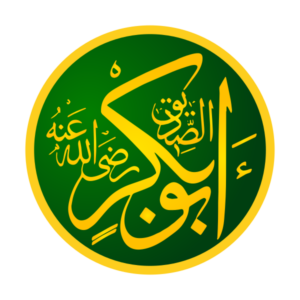 From His Sayings
From His Sayings
“No speech is good if it is not directed toward the pleasure of Allah. There is no benefit from money if it isn’t spent in the cause of Allah. There is no good in a person if his ignorance overcomes his patience. And if a person becomes attracted by the charms of this lower world, Allah will dislike him as long as he keeps this in his heart.”
“We have found generosity in Taqwa (God-consciousness), richness in Yaqin (certainty), and honor in humbleness.”
“Beware of pride because you will be returning to the earth and your body will be eaten up by the worms.”
When he was praised by people he would pray to Allah saying:
“O Allah, You know me better than I know myself, and I know myself better than these people who praise me. Make me better than what they think of me, and forgive those sins of mine of which they have no knowledge, and do not hold me responsible for what they say.”
“If you expect the blessings of God be kind to His people.”
One day he called `Umar and counseled him till `Umar cried. Abu Bakr ![]() told him:
told him:
“If you keep my counsel, you will be safe; and my counsel is: Expect death always and live accordingly.”
“Glory to God who has not given to his creatures any way to attain to knowledge of Him except by means of their helplessness and their hopelessness of ever reaching such attainment.”
Abu Bakr ![]() returned to Allah on a Monday (as did the Prophet himself) between Maghrib and `Isha on the 22 of Jumada’l-Akhira, 13 A.H. May Allah bless him and give him peace. The Holy Prophet
returned to Allah on a Monday (as did the Prophet himself) between Maghrib and `Isha on the 22 of Jumada’l-Akhira, 13 A.H. May Allah bless him and give him peace. The Holy Prophet ![]() once said to him: “Abu Bakr, you will be the first of my people to enter paradise.”
once said to him: “Abu Bakr, you will be the first of my people to enter paradise.”
The Prophet’s ![]() Secret passed from Abu Bakr
Secret passed from Abu Bakr ![]() to his successor, Salman al Farsi
to his successor, Salman al Farsi ![]() .
.
